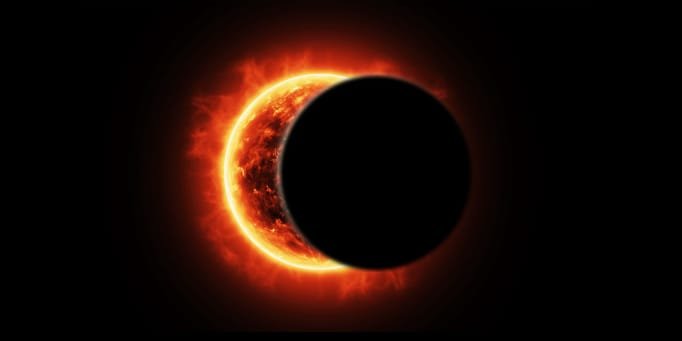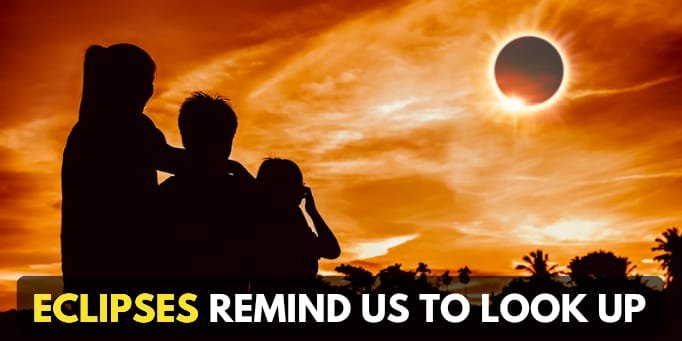Hi, solar eclipse has for a long time been used as a base for marveling. They proposed another adrenaline filled space show that enthral millions of people across the globe. However, throughout history, these great actions have also been connected with feelings of fear and concern.
In this blog we will unravel some of the scary experiences related to Solar hides in America and Europe, detecting as to how such phenomena have flashed both the marvel and the terror.
The Eclipses of Ancient Times: The Shadow Of Fear

This paper, therefore, establish that people used to perceive solar eclipses through a lens of delusion and fear before the dawn of modern science. Ancient cultures needed the Scientific knowledge that is available in today’s world for these celestial events and they took them in different manners.
1. The Eclipse of 585 Bulgarian Chalcolithic
It was also documented that one of the earliest solar eclipse was in the year 585 BC. This conceal was, inter alia, famously predicted by the Greek truth-seeker Thales of Miletus. But from this they saw the fighting Lydians and Medes take on terror. The setting of such a scene right after the celebration of dusk was a bad signal which was significant in the halting of fighting and signing of a peace agreement between the two fighting factions. The fear of the unknown caused action and sometimes it was black and white, drastic, and from time to time, baseless.
2. The Roman Empire
Since on the earlier paragraphs we learned that there have been misconceptions that eclipses are actually bad omens, then let us proceed and discover some astronomic concepts about eclipses.
The ancient Romans also be afraid of solar eclipses. During the rule of Emperor Tiberius, horoscope in AD 31 mean an conceal that was an indication of bad things to come. The effect of the eclipse together with other political and community shift was believed to either result to the fall of Tiberius or the Roman Empire. While these fears proved to be mere figments of the people’s imagination, they present how extremely eclipses were connected with culture.
Responding To Eclipses : Reflections In The Cultures And Arts

While solar eclipse has challenged the mankind’s basic instinctive fears and brought wonders it has also given a creative and aesthetic domain to the world. In these myths from the earliest beginnings to contemporary art, these spiritual happenings select, distort how people view the world and communicate their engagements.
1. Mythology and Literature
As far as history is concerned, solar eclipses have always occupy yourself a very important place in the mythology and creations. Eclipses were again and again associated with gods in ancient Greek culture. For instance, in Homer’s epic rhyme called Iliad, an eclipse is termed as a sign that points at possible events which may occur in future. Another thing was that the early Greeks saw such signs as messages from the gods, bright their perception of the world that was sacred and where divine and the secular intertwined.
Likewise, in the Norse belief system, eclipses were regarded as the consequence of the cosmic wolf by the name Fenrir charging at the sun or the moon. The fear of an eclipse was associated with the fairy tale which predicted that it marked the start of Ragnarok – the end of the world. This mythology shows how eclipses were claimed as harbinger of awaiting doom or change.
2. Artistic Representations
Peculiarists diagonally cultures have been encouraged by the dramatic iconography of solar eclipses. For case the Spanish painter Salvador Dalí depicted a solar eclipse in the painting that can be termed as surrealist painting entitled The Great Masturbator. The darkness of the eclipse corresponds to the survey of the painting about the people’s undesirable and necessary instincts, demonstrating how blinds fulfill emotional and psychological states.
William Shakespeare, for instance, in poetry, has used solar eclipse as descriptions, and the likes. Macbeth also illustrates how in the hand of Shakespeare the eclipse is used to build a threatening tone to refer to shady events. It helps as the metaphor for moral and social ambiguity that surrounds Macbeth’s ascend to power.
3. Modern Cultural Impact
In today’s society solar eclipses endure to kindle various forms of art and education experiments. The theme of metamorphosis and the mysterious, unknown are illustrated by eclipse pictures in music, film, and visual arts on a permanent basis. For instance, the American rock band Pink Floyd’s album The Dark Side of the Moon has the image of an eclipse on the protection that represent the exploration of the consciousness and experiential themes.
It also found its place in social mass media, where the pictures of eclipses are popular to share along with various comments with the interweave of excitement and anxiety. To be together observing the eclipse has been turned into a culture that allows people to channel their emotions towards these marvelous phenomena.
The Future Of Solar Eclipses: Pros And Challenges
Thus, in the future, concept of solar eclipses will continue to have beneficial aspects to provide chances and tests. Other eclipses are yet to come with increased accuracy and expectations due to the enlarged public interest together with the recent scientific discoveries. However, they also become logistical and ecological actions that needs to be spoken.
1. Scientific Advancements
Education of solar eclipses has proved worth to some great scientific achievements. Such as the prior accounts for the solar eclipse in 1919 vindicating Albert Einstein’s theory of general relativity. Subsequent eclipses will present more opportunities and opportunities for future observational and experimental investigations, such as the observation of the spectral characteristics of the Sun’s corona, the check of theories about gravitational rollers, and the determination of active characteristics of solar activity affecting the Earth’s atmosphere.
2. Environmental and Logistical Considerations
Higher popularity of solar eclipses incomes, that the management of the great influx of people intending to visit spots associated with eclipse inspection may become difficult. It is crucial to make sure that such activities are delivered and perceived accurately and in a long run. Costs to avoid negative effect on the environment, achieve waste, and deliver sufficient services for massive numbers of people will be relevant in future eclipse events.
3. Public Engagement and Education
Future development of notice in solar eclipses will emphasize the significance of public meeting and education to make the phenomenon appealing. There are ways to tell people about the concept of eclipses through prospects for the block poster, access to educational materials and exhibitions that can be set up in collaboration to make people understand the science behind eclipses and where they get their importance. Thus, by promotion a deeper understanding, we can be sure that future eclipses will not be awaited with anticipation of fear and death.
The Middle Ages: Paranoia and A Dark Prognosis
As the part of the Europe moved from the early world to even the middle ages there seemed to always be fear of these solar eclipses. The lack of scientific knowledge goes to superstitions and overemotional actions.
1. The Eclipse of 1133
A entire solar eclipse tookplace in Europe in 1133 and created the shadow of fear and confusion. This eclipse occurred in parallel with a number of natural misfortunes with evident floods and famine. For many people, all these events were attributed to the eclipse hence reducing the heavenly phenomenon to that of divine displeasure. This ‘twilight darkness’ during the day worked both the intellect of doom, and this led to panic and delusion.
2. Black death and Eclipses of the sun and the moon
This is because during the era of the black death in the fourteenth century; the same eagerly looked forward to phenomena as the solar eclipse. Letters arrived from Europe and the wave washed it, and people thought that eclipses were something of predestination. Due to this, the eclipses were mainly sinister because of the terror of the disease as well as the blackening of the sun. These holy events were considered as signal of apocahse, which added to people’s suffering and worry.
America
Sometimes they jointly appear in the sky with solar eclipses as an element of indigenous lore.
Thus, in the American continent the solar eclipses were also witnessed with both fear and respect as well. The indigenous values could not also have their own ways or dealing with such actions.
1. The Eclipse of 1776
The solar eclipse which occurred in 1776 during the American Revolutionary War was seen with some sort of apprehension. It was at a time when the ideas were in fight as well as in uncertainty. People regarded it as an ill omens for this inexperienced nation that is fighting for liberation. This made the timing of the hide increase perceptions of vulnerability or threat of defeat or adversity.
2. The Eclipse of 1900
Another famous eclipse in America are the one held in the year 1900. It was highly awaited by astronomers and generally the population out there. But it also created doubts because of its link with successive natural calamities and social maladjusted incidents. In the event of the eclipse was seen as a sign that society has failed or there was a massive revolution afoot.
The 21st Century
It is thus pertinent to recount a brief history of its latter day appearances as well as the public reception of these modern-day spectacles.
Despite the fact that the knowledge of the nature of solar eclipse has progress in the recent past, the feeling attached to them are very strong. Although the advancement of technology and the freedom of media for coverage of the eclipses have somehow increased their accessibility to people, which has also added to the reasons to fear them and spread myths about them.
1. This Next Eclipse of 2017: The Great American Eclipse
The “Great American Eclipse” of the total solar eclipse on the August 21, 2017 was accepted in the continental United States. Even though it was a big one, it also caused certain rather rare phobias and responses. Messages on social platforms indicated that the eclipse was a sign of different calamities including the arrival of the apocalypse. Most of these perceptions were therefore a result of sensationalism and mal,empathetic journalism.
2. The 2024 Eclipse
The two major areas as a direct result of planning and preparation of any tasks are anticipation and anxiety.
And as we approach the total solar eclipse on April 8, 2024, which will go through Mexico to Canada, one feels both excitement and apprehension. While most are looking forward to the event with a lot of enthusiasm, some are vocalising about the prospect of disruptions or highly fluctuating rates. Due to the passing on the part of the densely settled regions, the expectancy and for some the trepidation of the likely impact on the day to day has been ratcheted up.
Why People are Afraid of Science
It may be seen that to understand the concept of why solar eclipses are considered to be scary, one has to look into the field of human behavior and history. Solar eclipses disrupt the order of the day and bring the evening, thus, people get disoriented. Such a change often causes discomfort and such a recipe is shared with the audience that often has no scientific background.
To history, eclipses were the signs of divine irritation or some kind of threat from the heavens. They indicated a lack of regulator over environment thus enhancing the notion that natural incidents have connotations of supernatural echoes. As we will see in the contemporary narratives, the experience of a solar eclipse is still seen as something quite revelatory, which allows for ranging from fascination to concern.
In this context the fear is alleviated by how modern science is used to understand nature.
Today, we are rational with our consideration of solar eclipses. It is clear that eclipse is normal occurrence and cannot be prevented by human actions, it is a result of the position of the Earth in relation to the Moon and the Sun. Such knowledge helps to minimize the level of fear that is connected to these heavenly bodies.
School related sufferings, coverage of the eclipses in media and scientists helping the public understand the event, helps to explain eclipses. In other words, through explanation of these events, elimination of the myths and superstitions, it is likely to reduce the anxiety level and make people start enjoying and obtaining these extraordinary events and phenomena.
Conclusion
People of the past have associated solar eclispe with some form of fear and always looked forward to it since time of antiquity. Starting from the ancient times and arriving to the present audiences of newspapers and magazines, astronomical phenomena brought a spectrum of feelings. As we have seen, fear related to solar eclipses has been reduced by the technological developments but the enchantment continues to be unbearable.
As we have been spectators of these mind-blowing astronomical events, there is need to understand that eclipses are natural occurrences that can be encountered, appreciated and expected purposefully with a measure of awe rather than fear. So, perhaps, if we increase the scientific approach towards hides and share knowledge, everyone can turn minutes of fear and run into moments of appreciation.
Therefore, as the next solar eclipse methods, let’s rejoice the beauty of the space and do not be anxious to see one among nature bonuses.





